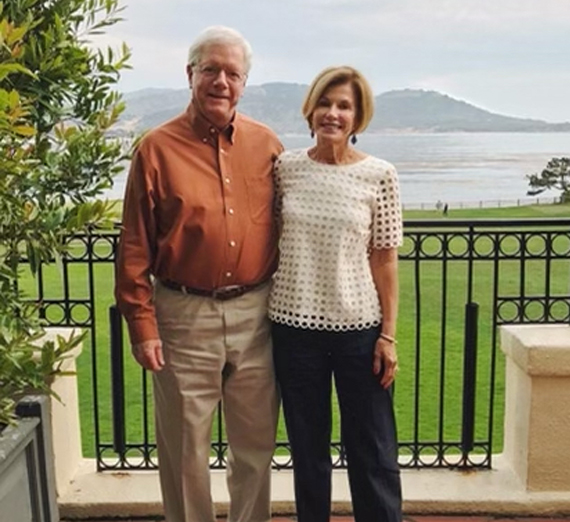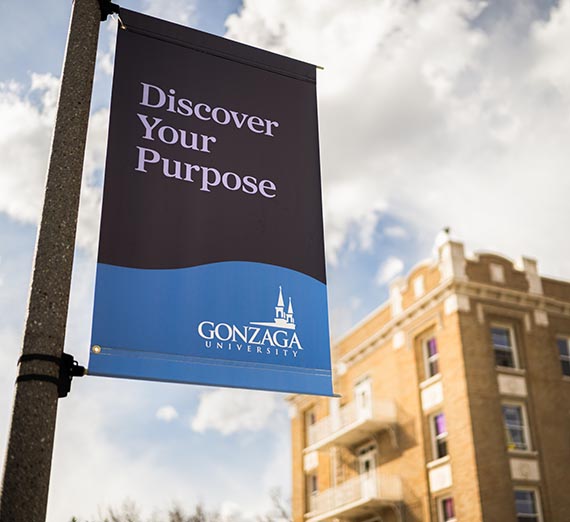Leading Toward a Future Civil Discourse

Across the nation, the political divide has become a gaping crevasse rather than a figurative line in the sand. Back-biting and name-calling are the norm, making it difficult if not impossible to engage in meaningful conversation with someone who has a different perspective than our own. We’re identifying people and groups by monikers of disgust rather than by sets of principles.
In the academic environment, learning occurs by exploring perspectives different from our own, and asking respectful questions that help us understand one another. A college degree based on Ignatian pedagogy should go several steps further, incorporating critical thinking, compassionate listening and openness to changing our minds, for starters.
– Father Peter-Hans Kolvenbach, former Superior General of the Society of Jesus
This quotation provides both hope and an imperative, says Provost Sacha Kopp. “It also reminds us of our mission and opportunity to bring not only solutions to the problems that vex society today, but healing and consolation to communities that are divided.”
A number of campus departments design events and opportunities with an aim to foster civil discourse. These include the Center for Teaching and Advising, the Office of Inclusive Excellence, Unity Multicultural Education Center, Human Resources, Mission Integration and more, all of which underscore Ignatian principles such as the practice of presupposition (believing in the best of intentions in others).
“How do we ensure our students learn how to think (not what to think)? How do we foster a culture of listening to learn, valuing diverse perspectives, and strengthening relationships through civil and humane discourse?” Kopp asks.
These questions are the heart of initial stages in developing what he hopes may become an institute for civil discourse and Ignatian dialogue at Gonzaga.
Over the past several years, as the nation has seen the capacity for authentic discussion and civil discourse between opposing political parties and individuals deteriorate, Gonzaga has been considering how a Jesuit university might play a critical role in rebuilding this competency among its students and community members.
LESSONS IN MEDIATION
Research. Negotiation. Oratory. The ability to listen to all sides of an argument, irrespective of one’s personal feelings. And the ability to disagree with someone without being disagreeable.
It all started with debate for Tim Thompson.
The skills he learned as a debate competitor first at Gonzaga Prep and then at Gonzaga University turned out to be skills he would parlay into a career that’s touched on national and local politics, the environment, business, tribal relations, health care, even his role on the Gonzaga Board of Regents.
That all adds up to what Thompson considers a lost art: civil discourse.
“I love the idea of bringing people together and getting things solved,” says Thompson. “We are at a time when, if we don’t start talking differently as a nation, we’re in trouble.”
That’s not hyperbole to Thompson. His early career was in the corridors of Congress, having successfully led Tacoma- based Rep. Norm Dicks’ election campaign in 1982 before joining the House Health & Human Services Appropriations Committee as a legislative assistant. A decade at the U.S. Capitol gave him a front-row seat to arguably the last era of true bipartisanship in Washington, D.C.
He saw how a Congress led by strong figures like Tip O’Neill and his successor, Spokane’s own Tom Foley, both Democrats, could openly and eagerly make deals with Republicans across the aisle and in Ronald Reagan’s White House.
“Debate was all about research, and now I was doing that in D.C.,” Thompson says. “I thought, ‘This is the greatest job ever.’ ”
Eventually Thompson, a Spokane native, wanted to come home to Washington. First he joined Dicks’ Tacoma office, where he negotiated efforts to clean up Superfund sites, reinvest in the arts and boost research at the University of Washington, particularly in medicine.
One project followed Thompson from Dicks’ office to the private sector, where he first joined the Gordon Thomas Honeywell law firm as a mediator and negotiator before starting his own shop, Thompson Consulting Group.
The Puyallup Lands Claim Settlement found Thompson moderating discussions between tribal, local and federal government groups, various business interests, environmental advocates and more. It was a lengthy, complex process, and one rife with clear racism against the tribal entities involved.
“I learned all about mediating and facilitating” during that process, Thompson says. “It was raucous. People walked out.”
Current discourse in the halls of power and among the citizenry certainly leans more divisive than compromising, and that’s a problem, Thompson believes.
“I see people in this environment more interested in throwing grenades than governing,” Thompson says. “They don’t really want to get to an agreement. They don’t know each other. It’s more about scoring points. They get rewarded for the most outlandish things they say.”
That’s why Thompson is hopeful the University may provide community discussions “to bring more civility to our democracy and political discourse to address the nation’s challenges.”
“We need to create the environment for people to be open and honest and able to put their cards on the table,” he says. “Without that, we’re not getting anywhere.”
Imagine opportunities for people from across the political spectrum to come together for a productive discussion of a complicated issue, and maybe even agree on some initial action items.
“People have lost faith in the ability to solve problems,” Thompson says. “We tend to blame our leaders. We can’t keep blaming institutions and politicians. This is the responsibility of the citizenry in a democracy.”
FACULTY INSIGHTS
We asked faculty members to answer (in 125 words or less) what civil discourse means to them through their specific academic lenses. Here are a few responses.
Kimberly P. Weber, Professor of Special Education School of Education
Civil discourse is essential to develop beyond ourselves. Being able to accept that many are never able to accurately see from another’s vantage point can become a place to begin to search for common ground and agreements that can benefit many. It is often difficult to understand the view of another when our minds are full of our own opinions, knowledge and experiences. Learning to set aside what we think we know may open doors to seeing beyond ourselves. We must speak kindly, listen intently, hear hard things, show respect through actions, and see that not everything is about us. How will we make changes the world needs most if we are unable to have the difficult conversations needed to gain a larger worldview?
John N. Sheveland, Professor of Religious Studies College of Arts & Sciences
In the exchange of wisdom but also grievances across lines of religious difference, civil discourse is a skill and a calling. It invites the opening of minds and hearts to the humanity of others, not to agree, disagree, or change their ideas but in a desire to encounter and accompany, with hope for reconciliation. Because we lack the deep listening which strengthens civil discourse, we are called out from habituated narrowness of vision and indifference. In 1994 the Jesuits wrote, citing an address of John Paul II in Chennai, “An open and sincere interreligious dialogue is our cooperation with God’s ongoing dialogue with humanity. ‘By dialogue we let God be present in our midst, for as we open ourselves to one another, we open ourselves to God.’ ”
Molly Pepper, Professor of Management School of Business Administration
In human resource management, we depend on civil discourse to create working environments where employees can thrive. Civil discourse is about building a culture of respect where people can bring their whole selves to the workplace and feel safe doing so. It is important that leadership models civil discourse through difficult but productive conversations, builds policies that support employee rights, and always follows through to rebuild relationships when discourse falls short of civility. In HR, we talk about training employees to engage in civil discourse, recognizing that an organization where diverse opinions are heard and respected is not only a great place to work, but is an organization with a competitive advantage.
Chris Francovich, Associate Professor, Doctoral Program School of Leadership Studies
I believe that what I think of as a common definition of civil discourse has to change – to move away from the liberal idea that the word ‘civil’ connotes a generalized and universalized ethical framework that ipso facto legitimizes hegemonic and/or global economic, political, social and psychological phenomena. What ‘civil discourse’ must, in my view, evolve to is the recognition that all interlocutors must learn the skills of suspending their judgments, preferences and biases while simultaneously regulating their affective response to the utterances and affects of others all the while staying with the trouble of establishing mutual intelligibility. A key element of this conceptualization is that the weight and import of significations must be commensurate with the local and situated nature of the discourse itself.
CHIME IN
MYRIAD OPPORTUNITIES
Topics discussed at recent campus events include:
- Death penalty case work, with Juandalynn Taylor
- Fighting poverty, with Cotopaxi founder Davis Smith
- Political and ethical dimensions of the renewable energy transition, with Griffin Thompson
- History of antisemitism on university campuses
- Testing of genetically modified herbicides in Hawaii, with Andrea Brower
- Immigration at the U.S./Mexico border, with Lisa Flores
- The Pope’s encyclicals on caring for the Earth and for the poor, with Cardinal Michael Czerny, S.J.
- Affordable housing, with a panel of Spokane experts
- Allyship between Native and non-Native peoples, with Nick Estes and Ali Michael
- Countering White Nationalism, with Kate Bitz
- God, evil and suffering, with Fr. Robert Spitzer, S.J.
- Black resistance, with Kiantha Duncan
- Pro-life perspectives, with Autumn Higashi
- Academics
- Alumni
- Academic Vice President
- Gonzaga Magazine






